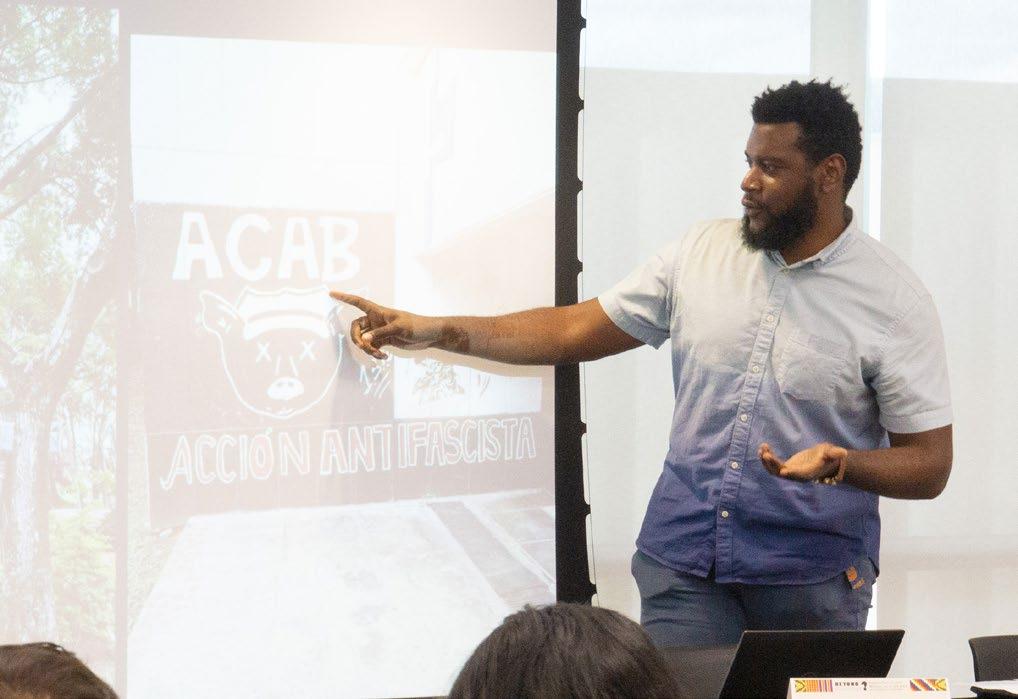
4 minute read
The Latinamericanist | Fall 2022
MALAS students present research, insight on Colombia elections
Alongside faculty and a guest scholar, Donovan Carter and Juan Carlos Moreno Perea (MALAS 2023 ) gave presentations on racialized Colombia and historic election
Advertisement
With the victory of Gustavo Petro in a run-off this May, Colombia elected a leftwing president for the first time in its history. The election signifies the prospect of a progressive future for Colombia, fueled by the tide of marginalized voters, particularly Afro-Colombian and Indigenous, that showed up in droves for Petro – and Francia Márquez, the Afro-Colombian grassroots activist who is now vice president of the country.
Such a landmark sociopolitical event offered robust discussion for the Center’s fall symposium, “Beyond Symbolic? Gustavo Petro, Francia Márquez, and the New Policy of Inclusion in Colombia.” As the title suggests, the symposium sought to discuss questions of what might come next for Colombia, and if a leftwing government would lead to actual social or material change for underrepresented Colombians. Led by Wayuu scholar and anthropologist Weildler Guerra Curvelo as the keynote speaker, the event also featured an interdisciplinary panel of Colombian professors affiliated with the Center: Paola Uparela (Spanish, Gender Studies), Juliana Restrepo Sanín (Political Science), and Augusto Oyuela-Caycedo (Anthropology).

Donovan Carter shares images of anti-police graffiti taken during his summer field research in Cali, Colombia
Importantly, two additional voices rounded out the schedule of speakers: those of MALAS students Donovan Carter (right) and Juan Carlos Moreno Perea (featured on the cover of this issue). Donovan presented his research on Cali, Colombia during the 2021 national strike that was a crucible for progressive sentiment in the country, a result of police violence and government crackdowns on protests. “I went to Cali a year after the paro nacional [national strike], in the heat of election season,” Donovan shares. “The whole city was talking about Petro, and I could still see effects of the strike in anti-police street art everywhere in the city.”
Images of graffiti took center stage in Donovan’s presentation, illuminating the inextricable connections between race, protest, and politics in Cali. “Graffiti is such a unique medium,” he says. “It’s so grassroots, with connections to anti-establishment counterculture, that it’s very revealing. It spoke for itself better than I could explain it.” For Donovan, a Black man from the United States, seeing anti-police language from the U.S. scrawled on walls in Colombia was particularly affecting: “I was able to see the breadth and scope of the African diaspora in a new light that was really exciting to me.”
Although Donovan and Juan Carlos are both young Black scholars studying racialized Colombia, they are pursuing different research, and of course, come from different backgrounds and perspectives. Where Donovan is from the southern U.S., Juan Carlos is from the Quibdó-Chocó region of Colombia. A teacher himself, he aims to increase visibility of Black scholars in his country, and his research centers representation in and access to education for Afro-Colombians, which is drastically limited due to racist social convention. “Colombia actually has a really beautiful constitution,” Juan Carlos shares. “But its laws are not being implemented. I’m interested in understanding that implementation gap so that it can be closed one day.”
For the purposes of the symposium, Juan Carlos did additional research to present electoral statistics and cultural context on the election of Petro and Márquez. When asked if their election portends real or symbolic change, Juan Carlos replies: “This is the first time in history that Black people have been able to elect someone who represents us in the national agenda. We actually had five Black candidates for vice president, but Francia Márquez is the one who has been fighting for human rights of Black people since she was young. We know she’s not going to solve all of our problems, but she’s paying attention. She’s shown that she’s trying to do something about it. This is a very good beginning.”
While the symposium’s attendees gained insights from Donovan’s and Juan Carlos’s research, the two young scholars benefited from the opportunity to simply present a topic to peers and professors alike. “Presenting really helped me start conceptualizing and articulating how I want to write my thesis,” Donovan says. For Juan Carlos, it was a return to his element: in a classroom, teaching, and embodying the visibility for Black Colombian scholars that he strives to magnify. ◆

